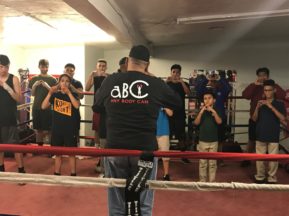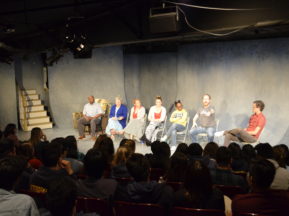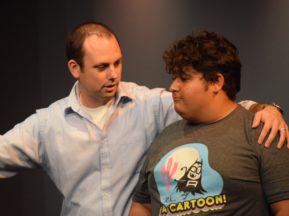“If we could make a positive difference in just one kid’s life, the Tournament will be worth all the time, effort, and resources we are putting into it.”
The Matt Stevenson Junior Tennis Tournament is the first and only junior tennis tournament in the United States to promote the importance of mental health. “This is such a meaningful tournament to promote the awareness of mental health issues faced by athletes, juniors and adults!” wrote one parent from Washington, D.C. “Mental health is important, and parents must be open to discussing it with their kids and seek help if any issues arise,” wrote another parent in NY.
The importance of raising awareness about mental health issues has gained even greater importance and urgency as a result of the pandemic and was best expressed by one of the junior players who competed in the Tournament:
“I think mental health awareness is super important because when someone breaks a bone they can see the injury or problem very easily but when it comes to mental health it is just as bad but actually maybe in some cases it can be much worse.”
In 2024, the Tournament theme was Community, Connection, and Co-opetition. For a more in-depth look at the mental health mission behind the Matt Stevenson Junior Tennis Tournament, we invite you to view this brief 12-minute video:
Support by the USTA President
The Matt Stevenson Tournament has the whole-hearted endorsement of the President of the United States Tennis Association (USTA), Dr. Brian Hainline.
On June 28, 2024, the Matt Stevenson Tournament held a first-of-its-kind Kickoff Event and Dinner Program for all the registered junior tennis players and their parents and coaches. At that Kickoff Event, Dr. Hainline recorded a special video message for the Matt Stevenson Tournament.
Speaking directly to the junior competitors in the Matt Stevenson Tournament, Dr. Hainline spoke about his own personal struggles with Mental Health as a college player. He went on to tell the junior players, parents, and coaches that “Mental Health matters” and that “Mental Health is important.” He asked all of us to be “part of a community that promotes wellness” and to “look out for one another.”
He then concluded by saying that the USTA made a pledge to “do everything in our power to elevate the importance of Mental Health in all junior players, adult players, and senior players.” This pledge, he said, is in line with the USTA’s mission to “grow tennis and inspire healthier people and communities everywhere.” He thanked the Matt Stevenson Tournament in particular for “taking Mental Health so seriously.”
Coming from the USTA President, the message was not only very special, but powerful and impactful.
Expansion of Tournament
The Tournament has now transitioned to a Level 5 Singles, Doubles/Mixed Doubles Tournament at Cary Leeds Center for Tennis & Learning in Bronx, NY. This USTA-sanctioned junior tennis tournament is a very popular event. In New York, it attracted 207 competitors in 2021, 303 players in 2022, 361 in 2023, and 545 in 2024! The Tournament is unique in that it provides a forum for sharing information with pre-teens and teens about mental health, depression, and suicide prevention. “We believe this is the first junior tennis tournament in the country to promote mental health as part of the event,” said Gary P. Poon, ProtoStar’s founder and president.
You can see the results of the singles, doubles, and mixed doubles events in 2024 for the various age groups by going to the USTA tournament website and clicking on the links below:
1. Boys, Girls 14-and-under and 18-and-under Level 5 Singles on June 29-July 1, 2024
2. Boys, Girls 12-and-under and 16-and-under Level 5 Singles on July 6-8, 2024
3. Boys, Girls 14-and-under and 18-and-under Level 5 Doubles/Mixed Doubles on July 14, 2024
4. Boys, Girls 12-and-under and 16-and-under Level 5 Doubles/Mixed Doubles on July 15, 2024
5. Boys, Girls 14-and-under and 18-and-under Level 6 Singles on September 14-16, 2024
6. Boys, Girls 12-and-under and 16-and-under Level 6 Singles on September 21-23, 2024
Promoting The Power of Mental Health®
The main message to the players ranging from ages 11 to 18 is the importance of staying mentally healthy. In addition to taking part in a physically healthy activity, the young players are introduced to the concept of The Power of Mental Health®. We think the phrase The Power of Mental Health appeals to the junior players because it reminds them of “power tennis” and reinforces the message that being mentally healthy gives them power – both on and off the tennis court.
The importance of mental health in tennis stood front and center when Naomi Osaka withdrew from the 2021 French Open, citing anxiety and “long bouts of depression.” When Naomi issued her statement on her social media page, ProtoStar applauded her courage in bringing mental health issues to the forefront. ProtoStar Applauds Naomi Osaka’s Courage in Speaking Out About the Importance of Mental Health-Updated 7-20-2021. Coco Gauff has also opened up publicly about her depression. Jannik Sinner has spoken about mental health through his “What’s Kept You Moving” initiative. In September 2021, Netflix released a documentary about Mardy Fish’ s mental health struggles, “UNTOLD Vol. 1: Breaking Point.”
ProtoStar teams up with the American Foundation for Suicide Prevention (AFSP) to set up a table at the Tournament site to hand out information about teen depression, anxiety, and suicide prevention. Materials from the National Institute of Mental Health (NIMH) are also available.
To help the junior competitors understand the interrelationship between general mental health and mental performance on the tennis court, the Tournament added something new in 2022: a table devoted to Sport Psychology. By competing in the Tournament, the junior competitors are given exclusive access to proprietary materials on how athletes optimize their performance in sports, such as enhancing their mental focus, dealing with competitive pressures, and getting into “the zone.” As many tennis stars and sports personalities have made clear, athletes can perform at an optimal level only if they take care of their mentally health in the rest of their lives. Of course, the information provided is for educational purposes only and does not constitute advice, therapy, or counseling.
The American Foundation for Suicide Prevention (AFSP) handing out information on depression, anxiety, and suicide prevention at the Matt Stevenson Junior Tennis Tournament (NY).
At the Matt Stevenson Tournament, kids can write “messages of hope” on Post-it® stickers, which AFSP would distribute to others who might be struggling. A few kids at the tournament even asked if they could take some of the messages home with them.

Writing “messages of hope” to someone who may be struggling with mental health issues.
Staying mentally healthy also means having to deal with bouts of depression and anxiety. Depression is very real. According to a national survey conducted in 2017 by NIMH, approximately 3.2 million adolescents between the ages of 12 and 17 in the United States (or about 13.3% of the adolescent population) had at least one major depressive episode.[1] Depression may be caused by several factors, including childhood trauma, alcohol or drug abuse, social media, and bullying.
We cannot talk about mental health without confronting issues relating to suicide prevention. Tragically, suicide among teenagers has been on the rise at an alarming rate. Even before the pandemic, the suicide rate among children and adolescents between ages 10 to 19, according to the Center for Disease Control and Prevention (CDC), had risen by a staggering 56% from 2007 to 2016.[2] There have been a number of high-profile suicides involving teenagers, including two who had initially survived the Marjory Stoneman Douglas High School shooting in Parkland, Florida. The lead article in the May 20, 2019 issue of USA Today reported that “the nation’s medical system falls far short of meeting the demand for teen mental health services because cases of suicide and psychiatric disorders are skyrocketing, underscoring a public health crisis that is already costing Americans billions to combat.”[3]
Making Mental Health Part of the Conversation
Unfortunately, these difficult topics are generally not talked about in sports. In her March 9, 2021 interview with the PBS NewsHour, Lisa Horowitz, a Staff Scientist/Clinical Psychologist at NIMH, noted, “We teach [kids] to read and to write and to do math and to do science. But when do we teach them what to do when you can’t bear a disappointment or you feel so alone and isolated that you can’t stand it anymore?”
The Matt Stevenson Junior Tennis Tournament seeks to break that pattern by reaching out to kids through a sport they love. Addressing the parents, coaches, and junior players at the Tournament’s inaugural ceremony in 2019, Poon said: “We talk about physical injuries in sports. Sprained ankle? Bandage it up. Broken bone? Put it in a cast. But if a player is feeling depressed, he or she might hear a comment like: ‘Pick yourself up. Just take a few laps around the track!’ We’re here to tell you that it is okay to talk about your feelings if you are depressed and that it is more than okay to seek help if you need it. And if you think you want to hurt yourself, by all means please find help immediately or call 911.” (An easier to remember hotline for suicide prevention, 988, is being rolled out across the country. Other suicide prevention resources are listed at the end of this article.)
Information about depression, anxiety, and suicide prevention is presented at the tournament by professional organizations in a low-key manner. AFSP provides helpful materials in a youth-friendly, inspiring, and uplifting way. There is information on how to reach out to a friend, what signs to look for, and what to do if the friend is depressed or contemplating suicide. NIMH’s mental health information is geared towards parents and coaches, such as “The Teen Brain: 7 Things to Know,” “Clinical Research Trials and You,” post-traumatic stress disorder, bipolar disorder, and schizophrenia.
These are indeed sensitive topics to talk about, but we must talk about them. Talking can save lives. That’s the whole point of this Tournament: to make these issues part of the conversation – whether on the tennis court, in the locker room, or simply around the kitchen table. “Some people may think it’s harmful to ask someone in crisis about whether they are contemplating suicide, that asking might somehow put the idea into their head,” added Horowitz. “That is a common misconception. In fact, the best way to steer a teenager away from suicidal thoughts is to ask directly, ‘Are you thinking of killing yourself?’ Then listen – really listen – to the answer and respond appropriately.”
“It’s a wonderful idea to reach kids through tennis,” said Noah Rubin, founder of Behind The Racquet, an initiative that gives touring pros a safe space to share stories about themselves, including mental health issues. “The more we talk about these issues, the more we can destigmatize mental illness. They may find that even some of their tennis idols also struggle with the effects of everyday life.”
“The 11- to 18-year-olds are in precisely the age group we wanted to reach through this Tournament,” added Poon. “As shown by the statistics, young people in that age bracket are most impressionable and vulnerable. We hope that by making mental health part of the conversation, kids will feel less alone and will more likely seek help when they need it.”
We hope to bring the mission of this Tournament to other cities as well because mental health, depression, and suicide prevention are national issues.
Effect of COVID-19 on Adolescents’ Mental Health
Unfortunately, ProtoStar had to cancel the Tournament in 2020 because of the COVID-19 pandemic. However, struggles with mental health issues have not abated, but have in fact worsened among adolescents. “A recent study of 3,300 high school students found that nearly one-third reported feeling unhappy or depressed in recent months…. Since the start of the pandemic, the National Alliance on Mental Illness has heard from many young adults experiencing anxiety and depression, which the organization attributes partly to social isolation.”[4]
With the lockdowns, stay-at-home orders, school closings, cancellations of youth sports and extracurricular activities, and paucity of social interactions during the pandemic, children and adolescents have expressed increased feelings of isolation, depression, and loneliness. According to a Gallup Poll, conducted in the early stages of the pandemic, nearly 30% of the more than 1,200 parents surveyed had reported that their school-aged children “were already experiencing harm to their emotional or mental health because of social distancing and closures.”[5] A more recent study conducted by the Center for Disease Control and Prevention (“CDC”) made the following findings:
Beginning in April 2020, the proportion of children’s mental health-related ED [Emergency Department] visits among all pediatric ED visits increased and remained elevated through October. Compared with 2019, the proportion of mental health-related visits for children aged 5-11 and 12-17 years increased approximately 24% and 31%, respectively.[6]
Numerous other studies have reached similar conclusions.[7] Mainstream media have also highlighted how the pandemic has exacerbated this mental health crisis.[8] Heart-wrenching are the stories of teen suicides that were attributed to feelings of isolation, depression, and despair stemming from the pandemic. They include Jo’Vianni Smith (a 15-year-old athlete),[9] Christian Robbins (a 16-year-old sophomore),[10] and Spencer Smith (a high school sophomore who had left a note saying he felt “locked in the house”).[11]
Sadly, mental health challenges have been more prevalent amongst the youth from low-income families.
The disruptions to daily life – and the associated stresses of lives on pause – have been perhaps most acutely felt by children from low-income families, experts said, many of whom live in predominantly Black and Latino neighborhoods that have been plagued by a rise in gun violence and disproportionately high coronavirus infection rates…. While most children should bounce back from isolation and remote learning, childhood development experts said, those growing up amid other adversities like domestic violence, abuse and poverty are struggling to cope with the turmoils of the pandemic – and face greater obstacles in recovering.[12]
Of course, the lockdowns, cancellations, and school closings were necessary from a public health standpoint in order to reduce the spread of the Coronavirus. However, we must also recognize the practical effects these closings had on our adolescents’ mental health and must therefore help them find constructive ways to deal with their depression, anxiety, and suicidal thoughts.
U.S. Surgeon General’s 2021 Advisory on Youth Mental Health
On December 7, 2021, the U.S. Surgeon General, Dr. Vivek H. Murthy, issued an Advisory entitled “Protecting Youth Mental Health.”[13] The purpose of the Advisory is “to highlight the urgent need to address the nation’s youth mental health crisis.”[14] It “calls for a swift and coordinated response to this crisis as the nation continues to battle the COVID-19 pandemic.”[15]
Citing much of the same statistics that ProtoStar relies on, the Surgeon General’s Advisory noted that there have been “alarming increases in the prevalence of certain mental health challenges” even before the pandemic and that the “pandemic era’s unfathomable number of deaths, pervasive sense of fear, economic instability, and forced physical distancing from loved ones, friends, and communities have exacerbated the unprecedented stresses young people already faced.”[16] Recognizing that mental health in children, adolescents, and young adults are “real,” “widespread,” “treatable,” and “preventable,” the Advisory “provides actionable recommendations for young people and their families, schools and health care systems, technology and media companies, employers, community organizations, and governments alike.”[17]
Two portions of the Advisory are particularly relevant to ProtoStar’s mental health campaign. First, the Advisory’s suggested action items for community organizations include finding ways to: (1) “educate the public about the importance of mental health, and reduce negative stereotypes, bias, and stigma around mental illness;” and (2) “address the unique mental health needs of at-risk youth, such as racial and ethnic minorities, LGBTQ+ youth, and youth with disabilities.”[18] Second, the Advisory also recommends certain actions that funders and foundations could do, including devoting funds to “invest in innovative approaches and research on mental health.”[19]
In organizing and sponsoring the Matt Stevenson Junior Tennis Tournament, ProtoStar is, with all due humility, already doing precisely what the Surgeon General has suggested. As the Tournament Organizer, ProtoStar acts in two distinct, but complementary capacities: (1) as a community organization to bring the community together on the importance of mental health; and (2) as a funder/foundation investing in innovative approaches to addressing the issue of mental health.
Youth Mental Health: A Greater Urgency Post-COVID
Addressing the Youth Mental Health crisis has become even more urgent post-COVID. According to NIMH, an estimated 5 million adolescents between the ages of 12-17 have had major depression in 2021,[20] up from 3.2 million in 2017. That amounts to about 20.1% of the U.S. population of adolescents with depression in 2021, up from 13.3% in 2017. The Center for Disease Control and Prevention (“CDC”) reports that in 2020, suicide was the second leading cause of death among children ages 10-14 and the third leading cause of death among adolescents ages 15-24.[21]
Recent data released by the CDC in February 2023 have sadly confirmed our suspicion that the pandemic has exacerbated what was already a national crisis in Youth Mental Health. According to CDC’s Report, “Nearly all indicators of poor mental health and suicide thoughts and behaviors increased from 2011 to 2021.”[22] The Report found that the percentage of teenage girls who persistently felt sad or hopeless increased from about 36% in 2011 to 57% in 2021. By 2021, approximately 69% of LGBTQ+ students felt sad or hopeless, and 45% seriously considered attempting suicide.
In May 2023, Dr. Murthy issued another Advisory, this time on loneliness and its detrimental effects on mental health.[23] “In addition to our physical health, loneliness and isolation contribute substantially to mental health challenges. …Loneliness and social isolation in childhood increase the risk of depression and anxiety both immediately and well into the future.”[24] As with the Advisory on Protecting Youth Mental Health, Dr. Murthy recommended that all of us have a role to play in combating the epidemic loneliness and isolation and thus address the mental health crisis, especially amongst our youth.
We are called to build a movement to mend the social fabric of our nation. It will take all of us—individuals and families, schools and workplaces, health care and public health systems, technology companies, governments, faith organizations, and communities—working together to destigmatize loneliness and change our cultural and policy response to it.[25]
The Matt Stevenson Tournament is about giving junior players the tools to maintain, improve, and optimize their mental health, as well as the resources to seek help if they need it. As Poon has said:
At the end of the day, the Matt Stevenson Junior Tennis Tournament is about bringing the community together to promote dialogue and understanding about the importance of mental health. If we can make a positive difference in just one kid’s life, it’ll be worth all the time, effort, and resources we are putting into this Tournament and The Power of Mental Health® Campaign.
Feedback About the Tournament
The reaction among the adults was overwhelmingly positive. “It’s wonderful what you are doing with this tournament,” said the parent of a 13-year-old competitor. Another parent was particularly moved by the message of the Tournament. He revealed that he had recently lost his eldest son to suicide.
The post-Tournament survey results were equally positive. Consistenty, virtiually all of the respondents were either satisfied or very satisfied with the overall event experience and indicated that they would highly likely return to play in this event the following year. Of particular note were the comments from the parents.
My son was very excited to not only play at the event but to be part of spreading awareness about a very serious topic. Would love to see more events have a teaching element outside of the game. :O) At the end of the day it’s not just about the points, it’s about the life lessons this amazing sport has to share.
***








4 Comments
Leave your reply.